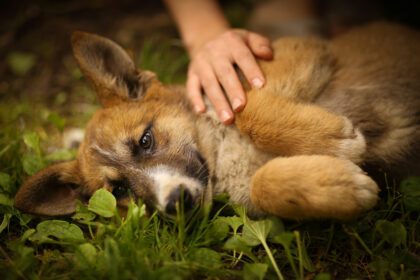
Thinking about our Second Principle—our commitment to nurture justice, equity, and compassion in our human relationships—has me thinking about other relationships. Namely, I’m thinking about our relationships with furry, four-legged members of our households.
No, we haven’t adopted a pandemic pet. But nearly everyone on our block seems to have at least one dog that requires frequent walking. I’ve learned that some of these furry friends came from animal shelters.
If you’ve ever been to an animal shelter, you’ve probably been able to tell which pups came from abusive situations. They might have withdrawn to a corner protectively whenever a person got close. Or maybe they lunged aggressively at anyone who approached. It might be tough to figure out how to treat a pet who’s had some hurtful interactions with other people.
I’m going to go out on a limb, though. I’m going to suggest that any animal who’s been hurt in previous relationships with people essentially needs the same thing: Relationships in which they aren’t abused.
People are more complicated than puppies. We have a lot of different ways of reacting when we’re hurt by people. We might distance ourselves. We might develop more aggressive coping techniques. We might just become people-pleasers and try to make everyone around us happy. Or any number of other behaviors we take on to protect ourselves.
We have a lot of creative ways of hurting one another too. You know from your own experience how hurtful a breach of trust can be between friends. Or how deeply it can cut when someone insults your appearance or your intelligence or your integrity. Or how painful it is to be blamed for things that can’t possibly have been your fault.
Everyone has experienced some hurt in our relationships. And most of us develop ways to cope with that hurt. Some of those methods may be more useful than others, but we all wind up with a certain amount of armor from our experiences with other human beings. Our defensive routines can help keep us safe from harm, but sometimes they also keep us from the quality of connection we most want with other people.
How does this relate to our commitment to nurture justice, equity, and compassion in our human relationships? Well, if we’re going to take this commitment seriously, we might begin by recognizing that everyone has some amount of armor on. Any human relationship we engage in is informed by all the other relationships we’ve experienced. And some of those experiences have been disappointing to say the least.
So, if we want to begin to create justice, equity, and compassion, we might start from a very basic place: Offering people a relationship in which they aren’t being abused. That might require us to take off a bit of our own armor, of course. But offering people a genuine relationship in which they aren’t being actively harmed in some way might be more extraordinary than we think.
It makes me wonder: What would it take for our community to be that kind of space? A space where everyone felt like they could safely leave their armor at the door and be in genuine relationships with other people in which they weren’t going to be wounded? Or at least, where the inevitable wounds are followed by genuine healing? Could that be where justice, equity, and compassion begin?
Rev. Randy Partain
Share this post: